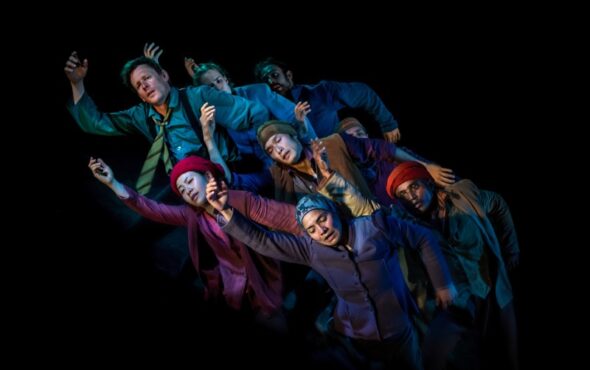
With migration and the lives of refugees never far from the headlines – indeed, this week has seen a crunch vote on the Government’s Rwanda policy – now seems an incredibly timely moment for new play Kin, from physical theatre company Gecko, to be staged at the National Theatre. Having originally premiered at Manchester’s HOME, it is now in London for a limited run. Devised by Amit Lahav – who also appears in the show – Kin explores the lived migration stories of the international ensemble, sharing their experiences of what ‘home’ means to them.
It’s very much a conceptual play – there is little dialogue, with the stories being told mostly through movement. There’s some impressive choreography in this piece, which is set quite beautifully to the music. The dialogue we do hear is delivered in brief snippets, usually in another language – we picked up conversations in Hebrew, Spanish and Mandarin, and there are more besides. It gave the impression of trying to overcome a language barrier, presumably an experience shared by many refugees.
We should note that Kin is not a particularly accessible piece of theatre – it’s much more about giving the impression of stories and alluding to the types of experiences that refugees may have, as opposed to going into detail about individual character arcs. This means it’s quite difficult to invest in any specific stories – we see families being torn apart and reunited, we see the physical and verbal abuse of border guards, but these start to feel like generic, universal experiences. Which could be the point that the show is making, but anyone looking for a clear narrative, with a beginning, middle and end, won’t find it here.
There are many enjoyable individual elements, however, which certainly deserve recognition. Chris Swain’s lighting design is excellent, creating some wonderfully intimate spaces on the vast Lyttelton stage; Mark Melville’s sound design impresses, too. It’s a visually-striking experience with numerous wonderful little gimmicks – the puppetry is superb, for example.
Sadly these individual elements don’t add up to a particularly satisfying whole – Kin feels more like a series of impressive vignettes as opposed to a cohesive play. The lack of specificity means it’s difficult to invest, which is frustrating given the nature of the stories being told here. It has some visually-stunning scenes, and it’s a unique experience inasmuch as it’s quite unlike anything else playing on London’s major stages at the moment, but we left the theatre feeling a little frustrated that it didn’t quite land the messages it’s trying to convey.
GAY TIMES gives Kin – 3/5
More information can be found here.



